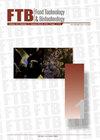Milk-Clotting Properties and Primary Proteolysis of a Lyophilised Extract from Artichoke Flowers (Cynara scolymus L.)
IF 2.5
4区 农林科学
Q3 BIOTECHNOLOGY & APPLIED MICROBIOLOGY
引用次数: 0
Abstract
Research background. A few studies have investigated Cynara scolymus enzymes as a substitute for calf rennet in cheese making. They used aqueous extracts prepared by maceration of plant material and stored by freezing. However, it was indicated that lyophilisation is a better alternative to preserve the coagulant properties of plant extracts over a longer period of time, as it is a more controllable, stable and hygienic alternative with a better shelf life that is easier to transport, store and standardise. Experimental approach. We obtained a lyophilised extract of mature artichoke flowers, named CS, which was characterised for its milk-clotting properties at different pH and temperatures. In addition, the potential yield, whey composition and the primary hydrolysis profile of caseins by urea-polyacrylamide gel electrophoresis (PAGE) of mini curds prepared with different doses of coagulant were determined. Results and conclusions. The lyophilised extract was able to hydrolyse casein and showed stable proteolytic activity at pH=6.4 and 37 °C for 50 min, which decreased when the process temperature was increased to 41 and 45 °C and was lost at 70 °C. On the other hand, milk-clotting activity increased significantly (p<0.001) when the temperature increased from 37 to 45 °C and the pH of the milk decreased from 6.8 to 5.8. Potential yield between 10 and 17 % was obtained for the mini curds prepared with the lyophilised artichoke extract, and the casein degradation pattern obtained by urea-PAGE was similar to that of the commercial coagulant. Novelty and scientific contribution. On a laboratory scale, our work has shown that the lyophilised artichoke extract has sufficient proteolytic and coagulant activity to be used as a milk coagulant, i.e. plant rennet, in cheese making as an alternative to animal rennet. As this extract is lyophilised, it has the advantage of being a better alternative in terms of preservation and shelf-life. It offers an innovative way to diversify cheese products and appeal to consumers with different dietary preferences and needs.洋蓟花(Cynara scolymus L.)冻干提取物的凝乳特性和初级蛋白水解
研究背景。一些研究已经研究了猪舌草酶作为小牛凝乳酶在奶酪制作中的替代品。他们使用浸渍植物材料制备的水提取物,并通过冷冻储存。然而,研究表明,冻干是一种更好的替代方法,可以在更长的时间内保持植物提取物的凝固特性,因为它是一种更可控、稳定和卫生的替代方法,具有更好的保质期,更容易运输、储存和标准化。实验方法。我们获得了成熟洋蓟花的冻干提取物,命名为CS,其特点是在不同的pH值和温度下具有凝乳特性。此外,通过尿素-聚丙烯酰胺凝胶电泳(PAGE)测定了不同剂量混凝剂制备的微型凝乳的潜在产率、乳清成分和酪蛋白的初级水解谱。结果和结论。冻干提取物在pH=6.4和37℃条件下水解酪蛋白50 min,具有稳定的蛋白水解活性,当工艺温度升高到41℃和45℃时,蛋白水解活性下降,70℃时完全丧失。另一方面,当温度从37°C增加到45°C,牛奶的pH从6.8降低到5.8时,凝乳活性显著增加(p<0.001)。用冻干洋蓟提取物制备的迷你凝乳的潜在产率在10%到17%之间,尿素- page法获得的酪蛋白降解模式与商业混凝剂相似。创新和科学贡献。在实验室规模上,我们的工作表明,冷冻干燥的朝鲜蓟提取物具有足够的蛋白质水解和凝固活性,可以用作牛奶凝固剂,即植物凝乳酶,在奶酪制作中作为动物凝乳酶的替代品。由于这种提取物是冻干的,因此在保存和保质期方面具有更好的替代优势。它提供了一种创新的方式,使奶酪产品多样化,并吸引不同饮食偏好和需求的消费者。
本文章由计算机程序翻译,如有差异,请以英文原文为准。
求助全文
约1分钟内获得全文
求助全文
来源期刊

Food Technology and Biotechnology
工程技术-生物工程与应用微生物
CiteScore
3.70
自引率
0.00%
发文量
33
审稿时长
12 months
期刊介绍:
Food Technology and Biotechnology (FTB) is a diamond open access, peer-reviewed international quarterly scientific journal that publishes papers covering a wide range of topics, including molecular biology, genetic engineering, biochemistry, microbiology, biochemical engineering and biotechnological processing, food science, analysis of food ingredients and final products, food processing and technology, oenology and waste treatment.
The Journal is published by the University of Zagreb, Faculty of Food Technology and Biotechnology, Croatia. It is an official journal of Croatian Society of Biotechnology and Slovenian Microbiological Society, financed by the Croatian Ministry of Science and Education, and supported by the Croatian Academy of Sciences and Arts.
 求助内容:
求助内容: 应助结果提醒方式:
应助结果提醒方式:


